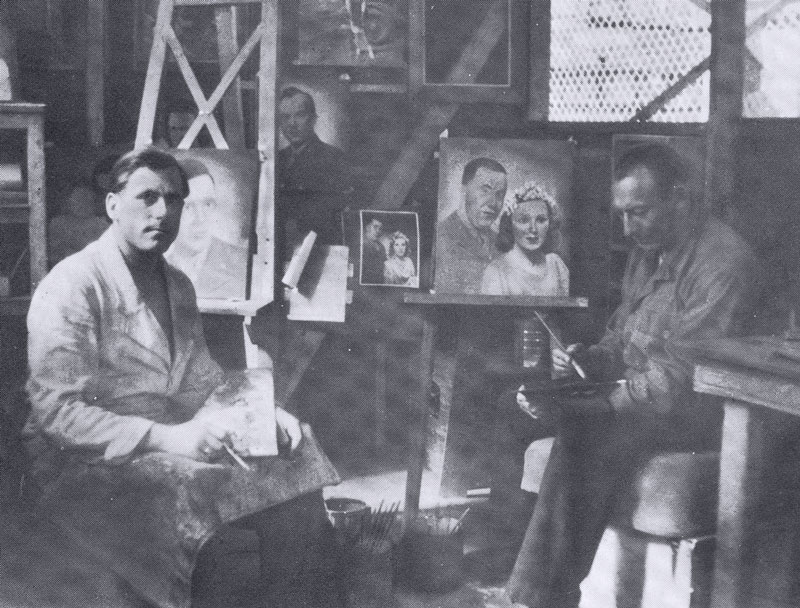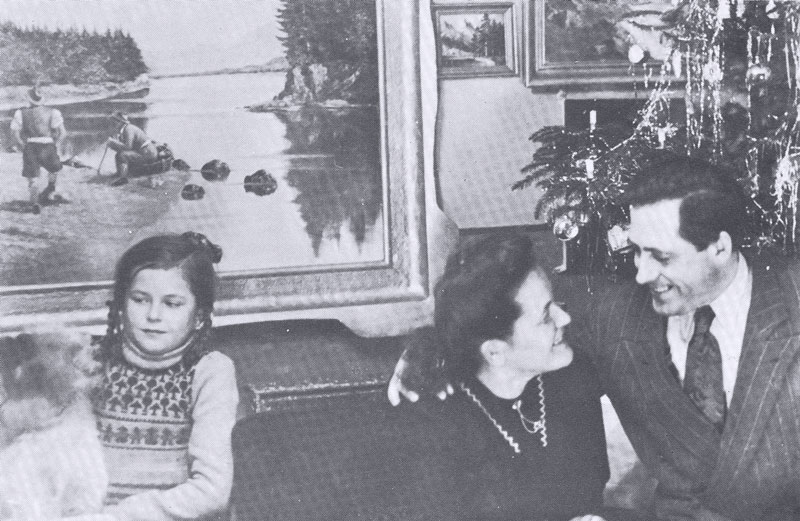Bill awoke that cold early morning to the sound of bleating. As he poked his head above his foxhole he saw sheep running toward his position. Sheep move toward people, he thought. As the sheep came closer, he realized they were crying in terror. Behind them, Russian soldiers were firing their rifles and throwing grenades. In a moment the whole area was in uproar with sheep, exploding shells, and flying bullets. “Why the devil am I here?” thought Bill. It was no time for philosophical questions because the next moment a Russian soldier smashed Bill in the head with a rifle.
I hate wars. I wish our leaders would find a way of dealing with people and countries as our brothers. — Bill Alexander

Landscapes of War
Bill’s dream was to be a game warden. With his love of nature and the opportunity to continue painting, it would have been the perfect job. A job like this, though, required twelve years of military service. So Bill joined the army. Unfortunately, the rise of the Nazi party, another World War, and three bullets would end Bill’s dream.
Early Army Career
By the time Bill joined the army, he had a wife and daughter. He was a sergeant stationed on some islands off the coast of Norway. Assigned to the boring and tedious work of digging ditches, Bill and his men developed a signaling system. It would alert them when officers arrived for inspection. The officers, though, discovered Bill’s system and were insensitive to the soldiers’ dreary circumstances. As punishment, they reassigned Bill to the Russian Front where the fighting and tactics on both sides were brutal.
The Eastern Front
Combat on the Eastern Front was fierce. Yet even in war, Bill sought beauty in nature. While walking in the nearby countryside during a lull in the fighting, he encountered a Russian soldier on a bridge. Bill befriended the man at risk of his own life. It was a brief moment of friendship in the midst of war. For the third time, a bullet found its mark on Bill. He was recuperating at a hospital on the Rhine river. He learned that recovered soldiers went to the Eastern Front one week and to the Western Front the next. If he waited for his wounds to heal completely, he knew he would go to the Eastern Front. Preferring to face the Americans rather than the Russians, he convinced a doctor to discharge him a week early.
Suicide Mission
Bill’s last military assignment was a suicide mission. Patton’s Third Army was approaching. Officers ordered Bill and his eight-man bazooka platoon to hold a forward position in front of the advancing army. Bill waivered. The officers assured him there were soldiers in front and behind for support. Bill and his men advanced to meet the tanks. He soon realized he and his men were all alone. As Bill advanced, he looked behind to embolden his men. They were gone. He realized he was alone in front of the American army. Desperate to save his life, Bill found a nearby French village where he had befriended one of the villagers. He convinced the man to let him hide in his home until morning when he could return to his unit. When he awoke the next day, Bill saw a group of German soldiers sitting on the ground with their hands behind their heads. For Bill Alexander, the fighting was over.
Prisoner of War
In Marseilles, there was a giant holding pen for tens of thousands of German prisoners. Every few days a jeep would arrive. A sergeant would ask if anyone had a specific skill: baker, cook, tailor, or even someone who spoke English. The sergeant never asked for an artist; and impatient with doing nothing, Bill decided to say he was a barber. The next day the sergeant returned and asked for a barber. Bill raised his hand, sprang to his feet, and yelled, “I’m the best barber in the world.” Now all Bill needed to learn was how to cut hair. In exchange for rations, a barber taught Bill some basic skills. Bill’s first haircuts were terrible. Over time, with patience, he learned to cut hair and became the best barber in the camp. Bill decided to set his barbershop apart from the rest. He decorated the walls with his paintings and provided drinks to the officers. One day an officer noticed his paintings and asked Bill to paint his portrait. Bill painted one portrait after another. One day a Captain asked him to paint a portrait of his parents from a photograph. The officer was so pleased with the painting that he set Bill up with a real artist’s studio. Bill’s open and friendly nature helped him develop a respectful relationship with his captors. They gave him a free run of Marseilles and encouraged him to emigrate to America.
Legacy of War

Bill was the last prisoner of war released from Camp 401. He had nowhere to go. His village was gone, swallowed up into the Russian Federation. His family was in a displaced persons camp somewhere in Russia. With the help of officers who had encouraged him, Bill moved to Giessen. He got a job at an American soldier’s club drawing print posters and handbills. Germany was in turmoil after the war. Most of the young men were either dead or captured. Inflation was rampant and the black market flourished. Bill survived by finding jobs here and there and painting, always painting. He never stopped trying to find his family. One day, Bill received a letter. His wife and daughter, safe, would soon return. The family spent the next two years in Giessen. By this time, Bill knew that his future was no longer in his homeland, so he decided to emigrate to America. Leaving his wife and daughter behind until he could build them a home, he left to begin a new life in a new country.


Gracias por contar su vida, yo tengo 70 años y comprendo que con el arte se es muy feliz.
I had personally heard some of his life story while painting with him in Powell River in the 80’s . Prior to Xmas I sent pictures to Yacolt address re the above with Bill for your files, and then after Xmas I sent copies of my paintings to the same address, and to date have not heard if either was received. I loved painting with Bill also his “Fire it in ” etc. Can someone please reply to my questions that went with those 2 lots of pictures. Thanks, J. Hill Ontario Canada
What a great story. Love the barber part. I can see him, “and we take the almighty clippers aand fire them in!”
I love watching him and can feel his energy and love for painting. I really need to improve my technique.
I hope that one day I can afford to enroll in the Master Class or any of them. But like Bill in his early days the shekels are few and far to come by. But on a happier note I have completed a painting that I was asked to do and should make a few “happy bucks” from it. If I make it long enough I plan to take the class.
Here’s hoping